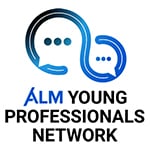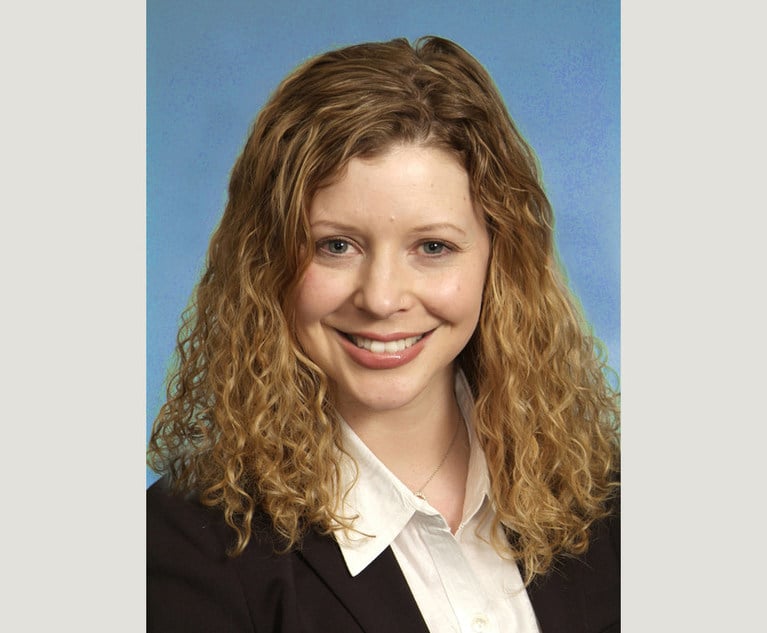Ruth Schoenmeyer, 51, Partner, Eversheds Sutherland (US), Chicago
Accolade: ALM's GlobeSt Women of Influence 2022 awardee.
Practice Area: Real estate.
Law school and year of graduation: University of Michigan Law School, 1995.
 Ruth Schoenmeyer/courtesy photo
Ruth Schoenmeyer/courtesy photo Recommended For You
How long have you been at the firm? I joined Eversheds Sutherland in 2020 as a partner. I first became a partner at Pircher, Nichols & Meeks, a real estate boutique that no longer exists. I have worked both in-house and in private practice during my career, and I also worked a reduced budget for many years, so I didn't make partner until I had been practicing for more than 20 years.
Why did you decide to practice law in the real estate industry? When I graduated from law school, I worked for Ballard Spahr in Denver, and I had every intention of becoming a litigator. At that time, the Ballard office in Denver did not assign first-year associates to a particular department, so I worked for several different groups, including litigation, corporate, environmental, and real estate. I fell in love with real estate because the work felt very tangible to me.
What do you think was the deciding point for the firm in making you a partner? The year before I became partner, I worked on a very significant and complicated lease for a brand-new building that was constructed where the Magnificent Mile meets the Chicago River in Chicago. Also, the partner for whom I did much of my work retired, and I serviced both her clients and some of my own. I imagine that my election to partnership was a result of the usual combination of hard work and good luck.
Describe how you feel about your career now that you've made partner. For me, chief among the perks of being partner—especially a woman partner—is the opportunity to present the perspectives of people who may not be well-represented in the room where decisions are being made.
What's the key to successful business development in your opinion, and how do you grow professionally while everyone is navigating working remotely and in person? The key to successful business development is creating, establishing, and maintaining relationships. You have to do great work as well, of course, but on balance, I think the relationships are just as important. Early in my career I thought that there might be something magical about establishing relationships with clients, but actually, client relationships are similar to any other relationship in your life: they require a sense of connection, mutual respect, and care and feeding.
As far as growing professionally is concerned, I am involved in a number of professional organizations, and I have continued to work with them while working remotely. The attorneys in those organizations share my enthusiasm for real estate law, and if I ever have a knotty issue or a question about how things are done in a particular state, I usually know someone to call. In short, we are a bunch of old-fashioned real estate nerds.
Who had the greatest influence on your career and helped propel you to partner in real estate? My mentors include Karen Samuels Jones when I worked at Ballard Spahr in Denver and Don Horvath and Sid Saltz when I worked at Jenner & Block in Chicago. All of them took time to explain to me why we do what we do, and Don Horvath in particular gave me meaty assignments, including one memorable lease negotiation that allowed me to spend two days with a roomful of opposing counsel, business people, and clients in Mexicali, Mexico. All of my mentors were generous with their time and their knowledge.
What advice would you give an associate who wants to make partner in real estate? Make yourself indispensable to clients, and remember that in the early days, those "clients" include the colleagues for whom you do work. How do you do that? Be prompt, be brief, use plain English, and be sure that you are answering the question that is being asked. Also, maintain your relationships, both inside the firm and out. If I could do one thing over, it would have been to maintain relationships with everyone I encountered in my professional travels because you never know when the business person you work with at one company is going to recommend you to her general counsel at a new company.
What challenges, if any, did you face or had to overcome in your career path and what was the lesson learned? For me, the biggest challenge in my career was figuring out how to continue to work at a high level while also raising my daughter. Like Goldilocks, I tried a number of different approaches, including working full time in private practice, working full time in-house, and working a reduced schedule in private practice, before I found one that was "just right." This approach resulted in a long and winding approach to partnership, but it worked for me personally, and it gave me a tremendous amount of empathy for those who have other responsibilities outside of the office.
For career advancement advice and success stories, check out the "How I Made It" Q&A series on Law.com.
 ALM's Professionals Network on LinkedIn, Advancing Future Leaders. We are excited about this pivotal group. Click here to join.
ALM's Professionals Network on LinkedIn, Advancing Future Leaders. We are excited about this pivotal group. Click here to join.
© Touchpoint Markets, All Rights Reserved. Request academic re-use from www.copyright.com. All other uses, submit a request to [email protected]. For more inforrmation visit Asset & Logo Licensing.





